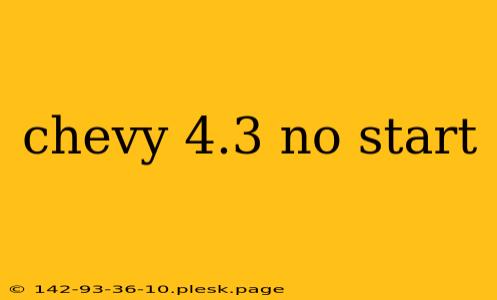A Chevy 4.3L engine refusing to start can be frustrating, but with systematic troubleshooting, you can often pinpoint the problem. This guide walks you through common causes and solutions, empowering you to get your vehicle back on the road.
Common Reasons Your Chevy 4.3L Won't Start
Several factors can prevent your 4.3L Chevy engine from firing up. Let's explore some of the most frequent culprits:
1. Fuel System Issues:
- Empty or Low Fuel: This might seem obvious, but always check your fuel gauge first. A surprisingly common oversight!
- Fuel Pump Failure: A malfunctioning fuel pump prevents fuel from reaching the engine. Listen for the hum of the fuel pump when you turn the key to the "on" position (but don't crank the engine). No hum often indicates a faulty pump.
- Clogged Fuel Filter: A clogged filter restricts fuel flow, starving the engine. Replacing the filter is a relatively simple and inexpensive fix.
- Fuel Injector Problems: Faulty injectors might be clogged or not delivering fuel properly. This often requires professional diagnostics.
2. Ignition System Problems:
- Bad Battery: A weak or dead battery is a frequent cause of no-start conditions. Check the battery voltage with a multimeter. Low voltage points to a battery issue, which might require charging or replacement.
- Corroded Battery Terminals: Clean and tighten corroded terminals to ensure a good electrical connection.
- Faulty Starter Motor: The starter motor cranks the engine to initiate combustion. If you hear a clicking sound but no cranking, the starter might be the culprit.
- Ignition Switch Failure: A malfunctioning ignition switch prevents power from reaching the necessary components.
- Distributor Issues (Older Models): Older 4.3L engines use distributors. Issues like a faulty cap, rotor, or ignition coil within the distributor can disrupt the spark.
- Ignition Coil Problems (Later Models): Newer models may have individual coil packs for each cylinder. A failing coil will prevent that cylinder from firing.
3. Sensor Malfunctions:
- Crankshaft Position Sensor (CKP): This sensor tells the computer the engine's rotational position, crucial for proper timing. A faulty CKP sensor prevents starting.
- Cam Position Sensor (CMP): Similar to the CKP sensor, a malfunctioning CMP sensor disrupts engine timing.
- Mass Airflow Sensor (MAF): While not directly related to starting, a faulty MAF sensor can prevent the engine from running smoothly, even if it initially starts.
4. Other Potential Causes:
- Security System Issues: If your vehicle has an immobilizer or alarm system, a problem with the system could prevent starting.
- Wiring Problems: Damaged or loose wiring can disrupt electrical signals, leading to a no-start condition. Check for frayed wires or loose connections.
- Engine Control Module (ECM) Failure: In some cases, a faulty ECM can cause a no-start condition. This usually requires professional diagnosis and repair.
Troubleshooting Steps:
- Check the Obvious: Start with the basics – fuel level, battery voltage, and obvious visual checks for loose wires or damaged components.
- Listen Carefully: Pay attention to sounds when you turn the key. A clicking sound might indicate a starter problem; a whirring sound might point to the fuel pump.
- Visual Inspection: Look for any obvious signs of damage or corrosion around the battery, fuel lines, and ignition system components.
- Use a Multimeter: A multimeter is an invaluable tool for testing battery voltage, checking for power at various points in the system, and testing sensors.
- Consult a Repair Manual: A repair manual specific to your year and model Chevy 4.3L engine will provide detailed diagrams and troubleshooting information.
Disclaimer: This information is for guidance only. If you are not comfortable working on your vehicle's electrical or fuel systems, it's best to consult a qualified mechanic. Improper repairs can lead to further damage or injury.

